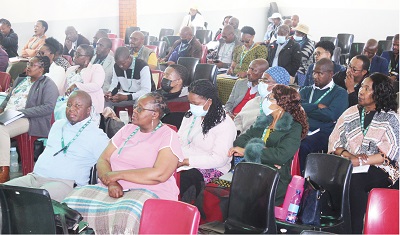By Mpho Shelile
MASERU Unlocking the full potential of education systems requires more sustained attention to and investment in school principals, as they play a vital role in shaping children’s school experience and influencing educational outcomes.
Henceforth the Institute of Development Management (IDM) held a one day workshop at Cenez high school last week Friday with the aim of assisting and training principals with leadership and management skills. Mr. Tŝo Sechaba, IDM’s Principal Consultant stated that in order for principals to become great leaders they must begin to apply systems thinking and personal mastery to their activities. Exercise emotional intelligence including being self – aware, managing their emotions, self-motivation, displaying empathy and managing relationships.
As managers and supervisors, principals must develop their leadership capacity while keeping up with the advancements of technology, science, and arts to spur increased school performance towards improving the quality, relevance, and competitiveness of education in the current global era. “Principals play a strategic role in developing a comfortable and conducive school atmosphere for learning, teaching, managerial processes, learning supervision, entrepreneurship, and developing school systems that encourage students and teachers to learn. Therefore, investment in the leadership capacity of school principals is essential to achieve school success. The forms of investment are in-service education and training, including pre-service education as preparation and provisioning before taking on the principal position
Indeed principals need the training to carry out roles and responsibilities to achieve school success. Training is important to obtain an optimal level of competence, practice performance management, opportunities for professional development, and improve their leadership capacity and quality. The principals become able to implement appropriate strategies to empower educational staff, give them opportunities to elevate their professions, and encourage them to engage in some school program activities effectively and efficiently. In other words, in-service training is needed to meet individual challenges, social and organizational changes, and courses to develop experienced principals.
“To succeed in today’s environment requires whole leaders who use both their heads and their hearts. Leaders have to use their head to tend to organizational issues such as goals and strategies, production schedules, structure, finances, operational issues, and so forth. They also have to use their heart to tend to human issues, such as understanding, supporting, and developing others. Having a heart while in a leadership role is particularly important in times of uncertainty and rapid change”, said Sechaba
“Our principals must learn how to give students and teachers a sense of meaning and purpose when major changes occur which is almost daily, how to make employees feel valued and respected in an age of massive layoffs and job uncertainty. How to keep morale and motivation high in the face of corporate bankruptcies and dissolutions, ethical scandals, and economic crises, and a broad literature has emphasized that being a whole person means operating from mind, heart, spirit, and body”.
He quoted one of the greatest philosophers Aristotle, “Anybody can become angry –that is easy, but to be angry with the right person and to the right degree and at the right time and for the right purpose, and in the right way – that is not within everybody’s power and is not easy”
Adding on he talked about self-management saying that it is the ability to use awareness of ones emotions to stay flexible and positively direct ones behavior and managing emotional reactions to all situations and people, “if your emotional abilities are not in hand, if you do not have self-awareness, if you are not able to manage your stressing emotions, if you cannot have empathy and have effective relationships, then no matter how smart you are, you are not going to get very far”, he concluded.
Mrs. Matšoanelo Litšoane the principal from Boqate ACL high school stated that the workshop was quite essential because it taught them various ways of coping with conflicts which may be encountered while in the work place. “I believe that this workshop will improve and increase staff competencies through access to specialized training and educational opportunities in the workplace, provided by what we learnt today, or through observing others perform their roles. It will also help build and keep the staff morale up”, said Mrs. Matšoanelo.
To be effective, school principals must prioritize their own professional development as a highly important element in providing insights necessary to perform their complex roles. But some of the principals cannot performs their duties well since they are just acting principals, “so when they are faced with making important decisions they cannot, because they are called names and abused by their fellow colleagues just because they have been acting principals for far too long without getting those positions permanently, and are not paid as well as they should be. Sometimes they do not get their salaries two months in a row, I plead with the government to consider hiring all principals since this may hinder their effective performance at schools” she concluded.
IDM’s country director Mr. Thibeli Molapo in his closing remarks stated that IDMs main purpose was to capacitate principals with leadership skills, “we hope with this skills they get to lead and manage schools perfectly, we also aim to lend a hand in making sure their jobs become easier. We have seen great impact on primary schools hence we decided to extend our services to the high school principals”, he stated.
A representative from Mahlabaneng high school Mr. Khotso Masitha said attending the workshop was the best decision he has ever made, he is now knowledgeable on how principals are supposed to work with their teachers and students, “I promise to use mechanisms I gained from these workshop to better my school, to raise funds for the school and apply the knowledge and skills I gained from the training.


